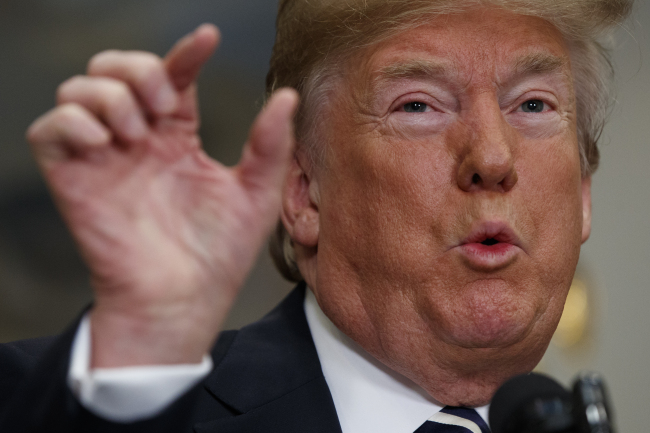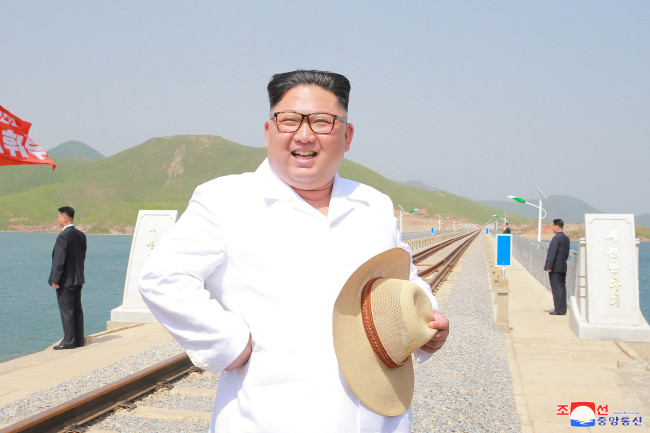Summit collapse likely to hit inter-Korean ties
Seoul emphasizes need for direct Trump-Kim communication
By Jung Min-kyungPublished : May 25, 2018 - 17:07
United States President Donald Trump’s cancellation of a planned summit with North Korea is likely to deal a heavy blow to inter-Korean ties, which have already been strained over the North’s recent belligerent rhetoric.
Trump on Thursday called off what was expected to be an unprecedented summit with North Korean leader Kim Jong-un scheduled for next month, citing the North’s “open hostility.”
The surprise announcement apparently shook the Moon Jae-in administration, prompting it to convene a crisis meeting around midnight followed by a National Security Council meeting Friday afternoon.

“The members of the NSC have assessed the current situation and confirmed the need for direct communication between leaders of the US and North Korea, and the government will continue to make necessary efforts,” Moon‘s top press secretary Yoon Young-chan said in a briefing held after the NSC meeting held Friday afternoon.
Yoon added that efforts to improve inter-Korean ties will contribute to improvement in US-North Korea relations and lead to the full denuclearization of the Korean Peninsula.
In the earlier statement issued after the midnight meeting, Cheong Wa Dae said that the lasting peace on the Korean Peninsula cannot be abandoned or delayed as it is a historical assignment, but noted the difficulty in resolving “sensitive and difficult diplomatic issues” with “the current way of communications.”
Though the ink has yet to dry on the Panmunjeom Declaration, Pyongyang has shifted to a hard-line attitude, souring the mood of peace that emerged with the inter-Korean summit on April 27. It also threw cold water on Seoul’s moves to implement the agreements reached between Moon and Kim at the truce village of Panmunjeom.
The North abruptly canceled a high-level meeting with the South last week, citing the South Korea-US joint military exercises, which it has often lambasted as rehearsals for invasion. Experts have also pointed out that the North took issue with Seoul’s lack of efforts to contain criticisms publically launched against Pyongyang by Thae Yong-ho, a high-profile North Korean defector.
It had also remained mum toward Seoul’s proposal to dispatch South Korean reporters to the dismantlement of its Punggye-ri nuclear test site on Thursday, though it accepted the list of pool reporters at the last minute.
Moon expected the two Koreas to resume the suspended meetings after the wrap-up of the Max Thunder exercise on Friday, Cheong Wa Dae had said Tuesday. But the cancellation of the summit presents a bleaker outlook for the talks.
“The Trump administration is expected to return to its policy of a maximum pressure campaign against North Korea, and as long as international sanctions stand, it will be difficult for inter-Korean ties to improve,” said Kim Hyun-wook, a professor at the National Korea Diplomatic Academy.
With experts stressing that inter-Korean ties are closely linked with US-North Korea relations, the summit cancellation poses a challenge for Moon, who has been making efforts to maintain dialogue with both Washington and Pyongyang. Assuming a mediator role, he has sought to bridge the gap between the two nations’ positions on denuclearization.

“It’s a crucial time for President Moon to show what he is capable of…there needs to be visible effort to communicate directly with both leaders of North Korea and the US to resolve this situation,” Kim Hyun-wook said, also stressing the need for direct communication between the parties involved.
Though a hotline between Moon and Kim was installed prior to the April 27 summit, the two have yet to communicate through the line.
Experts, however, are also pinning hopes on the fact that the US has yet to completely close the door on its meeting with North Korea. The North has also expressed willingness to talk with the US, despite the cancellation.
“Helping the US and North Korea find a point where they can agree on the issue of denuclearization is most important and the South Korean government will need to make efforts to keep both the US and the North at the negotiation table, while receiving help from China,” Choi Kang, vice president of the Asan Institute for Policy Studies, said.
Key cross-border projects which were expected to kick-off with the resumption of high-level talks, will have to wait until the issues surrounding denuclearization are resolved, analysts said.
While vowing to jointly seek a permanent end to the war on the peninsula, the two Koreas also agreed to revive cross-border projects including the reunion of families separated by the 1950-53 Korean War among other events. Economic cooperation was another keyword that was highlighted.
By Jung Min-kyung (mkjung@heraldcorp.com)



















![[Today’s K-pop] Treasure to publish magazine for debut anniversary](http://res.heraldm.com/phpwas/restmb_idxmake.php?idx=642&simg=/content/image/2024/07/26/20240726050551_0.jpg&u=)